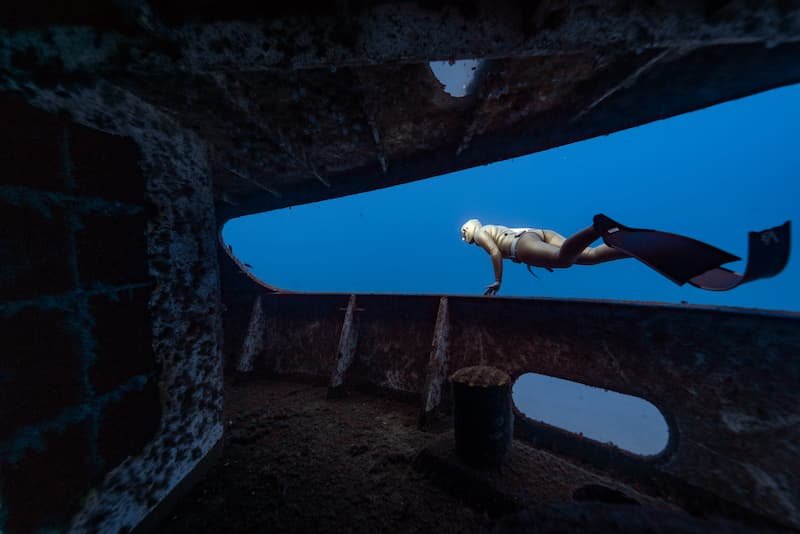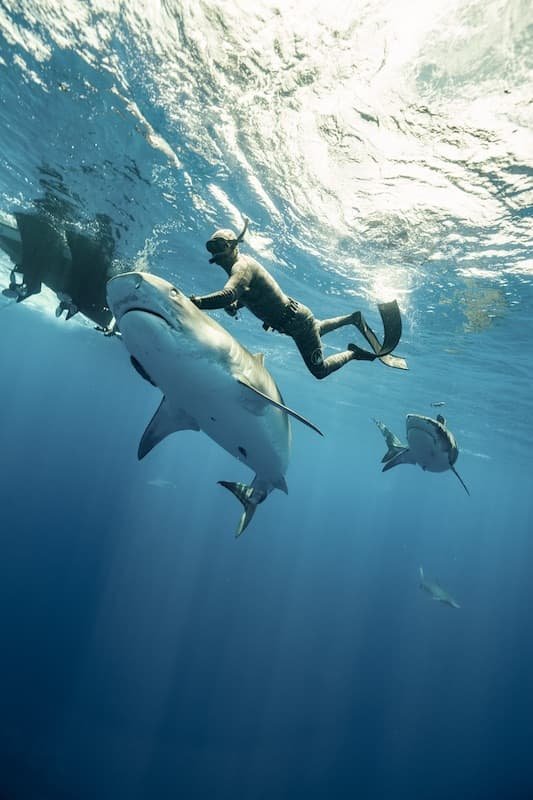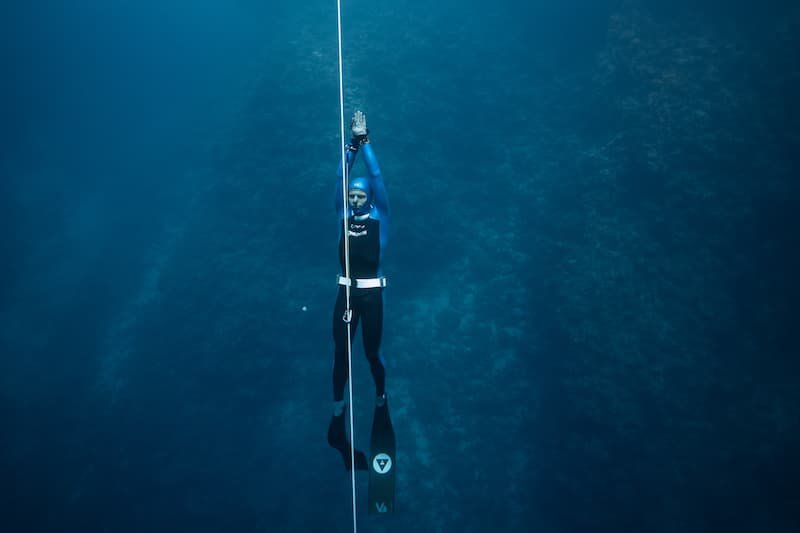
 Katie Wood
Freediver, Writer, Explorer
Katie Wood
Freediver, Writer, Explorer

 Katie Wood
Freediver, Writer, Explorer
Katie Wood
Freediver, Writer, Explorer
In the realm of freediving, mindfulness techniques play a pivotal role, acting as the bridge between the diver and the ocean. In this blog post, we'll delve into the essence of mindfulness and explore its significance in the context of freediving, uncovering how it enhances safety, performance, and the overall experience of this exhilarating sport.
Mindfulness, a term often bandied about in various contexts, finds its roots deeply embedded in ancient Eastern philosophies and practices. Originating from Buddhist traditions, mindfulness has transcended its religious origins to become a widely recognized and scientifically validated approach to mental well-being. At its essence, mindfulness is the art of being fully present in the moment, with an open and non-judgmental awareness of one's thoughts, feelings, bodily sensations, and surroundings.
In today's fast-paced world, characterized by incessant distractions and constant stimuli, the practice of mindfulness offers a respite—a sanctuary of stillness amidst the chaos. It invites individuals to step off the treadmill of autopilot living and cultivate a deeper connection with the richness of each passing moment. Rather than being lost in a whirlwind of rumination about the past or worries about the future, mindfulness encourages individuals to anchor themselves firmly in the present, where life unfolds in its full spectrum of sensations and experiences.
Central to the practice of mindfulness is the cultivation of awareness—a gentle yet unwavering attention to the present moment. This awareness serves as a gateway to deeper insights into the workings of the mind and the nature of reality itself. Through mindfulness, individuals learn to observe the constant flux of thoughts and emotions without becoming entangled in their narratives, thus fostering a sense of equanimity and inner peace.
One of the core components of mindfulness practice is mindfulness meditation, wherein individuals engage in structured exercises to develop their capacity for present-moment awareness. This may involve focusing on the breath, observing bodily sensations, or simply resting in an open awareness of whatever arises in consciousness. With regular practice, mindfulness meditation becomes a transformative journey—a gradual unraveling of the layers of conditioning and habitual patterns of reactivity that obscure the innate clarity and wisdom of the mind.
Beyond formal meditation practice, mindfulness can be infused into every aspect of daily life, from eating and walking to working and interacting with others. It's about bringing a quality of mindful attention to the most mundane of activities, infusing them with a sense of sacredness and presence. In essence, mindfulness is not just a practice but a way of being—a way of inhabiting the world with greater depth, authenticity, and compassion.
In the realm of freediving, where the stakes are high, mindfulness takes on added significance. Here, amidst the vast expanse of the ocean, mindfulness becomes a lifeline—a beacon of clarity and calm in the face of uncertainty and danger. It's not merely a luxury but a necessity—a fundamental tool for enhancing safety, performance, and the overall experience of this exhilarating sport.

Freediving is a unique blend of physical endurance and mental fortitude. Beneath the surface lies a world of tranquility and wonder, but it also presents challenges and risks that demand unwavering focus and composure. Here's why mindfulness techniques are indispensable in this sport.
Breath Awareness: Central to both mindfulness practice and freediving is the breath. In freediving, mastering breath control is essential for conserving oxygen and prolonging dive times. Mindfulness techniques such as breath awareness meditation enhance one's ability to regulate breathing patterns, synchronize them with movements, and remain calm in high-pressure situations underwater.
Stress Management: Freediving often pushes individuals out of their comfort zones, confronting them with the primal instinct for survival. Mindfulness equips divers with invaluable tools to manage stress and anxiety, enabling them to stay calm and composed amidst the inherent challenges of the underwater environment. By cultivating a non-reactive awareness of thoughts and emotions, divers can mitigate panic responses and make clear, rational decisions even in intense situations.
Heightened Sensory Perception: Mindfulness sharpens the senses and fosters a deeper connection with one's surroundings. In freediving, where visibility may be limited and encounters with marine life are fleeting, heightened sensory perception can enhance the overall experience. Divers practicing mindfulness techniques often report a heightened awareness of subtle changes in water temperature, pressure, and movement, enriching their underwater exploration.
Enhanced Focus and Concentration: The ability to maintain unwavering focus is paramount in freediving, where split-second decisions can mean the difference between safety and peril. Mindfulness training hones the diver's capacity to sustain attention on the present moment, minimizing distractions and increasing mental clarity. By cultivating a focused state of flow, divers can optimize their performance and delve deeper into the underwater realm with confidence.
Connection with Nature: Freediving is not just a sport; it's a profound communion with the oceanic world. Mindfulness fosters a sense of interconnectedness with nature, encouraging divers to approach their underwater adventures with reverence and respect. By immersing themselves fully in the present moment, divers can forge a deeper bond with the marine environment, nurturing a conservation mindset and a desire to protect our fragile oceans.

Breath Awareness Meditation: Take time each day to sit in a quiet, comfortable space and focus on your breath. Notice the sensations of inhalation and exhalation, observing the natural rhythm without trying to control it. As you cultivate greater awareness of your breath, you'll develop a deeper connection with your body's respiratory rhythms, which is crucial for freediving.
Visualization: Use visualization techniques to mentally prepare for dives and visualize successful outcomes. Close your eyes and vividly imagine yourself descending into the depths with ease, feeling relaxed and confident as you explore the underwater landscape. Visualization can help alleviate pre-dive anxiety and instill a sense of calm assurance.
Sensory Awareness Exercises: Practice sensory awareness exercises both on land and in the water to sharpen your perception. Pay attention to the sights, sounds, and sensations around you, allowing yourself to fully immerse in the present moment. By heightening your sensory awareness, you'll enhance your ability to navigate underwater environments and appreciate their beauty.
Progressive Muscle Relaxation: Prior to dives, engage in progressive muscle relaxation techniques to release tension and promote relaxation. Start by tensing and then gradually releasing each muscle group in your body, from your toes to your forehead. This practice can help alleviate physical and mental tension, allowing you to enter the water with a calm and centered mind.
Mindful Movement: Incorporate mindfulness into your pre-dive routines by moving with deliberate awareness and intention. Whether it's stretching, yoga, or tai chi, engage in activities that cultivate mindfulness of body and breath. By syncing your movements with your breath and maintaining mindful awareness, you'll prime your mind and body for the challenges of freediving.

By integrating mindfulness techniques into their practice, freedivers can unlock new depths of experience, forging a deeper connection with themselves, the ocean, and the awe-inspiring wonders that lie beneath the surface. So, as you embark on your next underwater adventure, remember to dive deep within and embrace the transformative power of mindfulness.